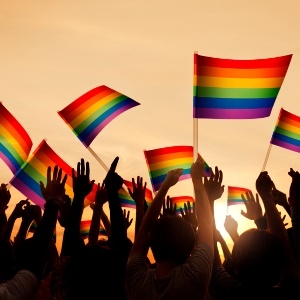
Bisexual, gay and lesbian adults are more likely to experience psychological distress and engage in unhealthy behaviours, possibly as a result of being the target of discrimination, according to a study published Monday.
Exposure to discrimination
The study in the US medical journal JAMA Internal Medicine analysed the results of the 2013 and 2014 National Health Interview Survey, which for the first time included a question on sexual orientation.
"Findings from our study indicate that LGB adults experience significant health disparities – particularly in mental health and substance use – likely due to the minority stress that LGB adults experience as a result of their exposure to both interpersonal and structural discrimination," the study said.
Read: Gay men face healthcare obstacles in Africa
The analysis showed that 40.1 percent of bisexual men and 25.9 percent of gay men reported moderate or severe levels of psychological distress, compared to 16.9 percent of heterosexual men.
Heavy drinking was reported by 10.9 percent of bisexual men, compared with 5.7 percent for heterosexual men and 5.1 percent for gay men.
Rates of heavy smoking were also highest among bisexual men at 9.3 percent, compared to 6.2 percent for gay men and six percent for heterosexual men.
'Marginalisation' by heterosexuals
Among women, 46.4 percent of bisexuals and 28.4 percent of lesbians reported moderate and severe psychological distress, compared with 21.9 percent of heterosexual women.
Bisexual women also had the highest rates of heavy alcohol consumption, 11.7 percent, compared with 8.9 percent for lesbians and 4.8 percent for heterosexual women.
Read: Teen painted red for being gay
Heavy smoking was most prevalent among lesbian women at 5.2 percent, followed by bisexual women at 4.2 percent. The rate among heterosexual women was 3.4 percent.
The negative findings for bisexual adults may be linked to their "marginalisation" by heterosexuals and "stigma" from gays and lesbians, according to the study, led by Gilbert Gonzales of Vanderbilt University.
JAMA Internal Medicine Deputy Editor Mitchell Katz wrote in an editor's note that it's important for medical professionals to ask patients open-ended questions.
"For example, asking a new patient whether he or she has sex with men, women or both indicates openness and acceptance," he said. "In caring for people who have experienced bias and discrimination, support is a very potent medicine."
The study compared responses from 525 lesbian, 624 gay and 515 bisexual adults with those of 67,150 heterosexual peers. The average age of participants was nearly 47.
Read more:
Few US doctors knowledgeable about LGBT health
The horror of 'corrective' rape
The verdict is in: homosexuality is not a choice




 Publications
Publications
 Partners
Partners










